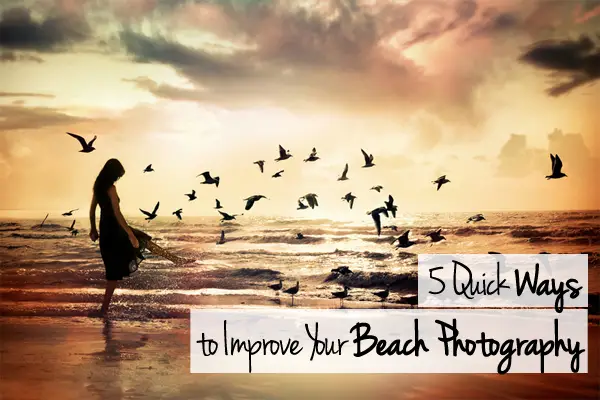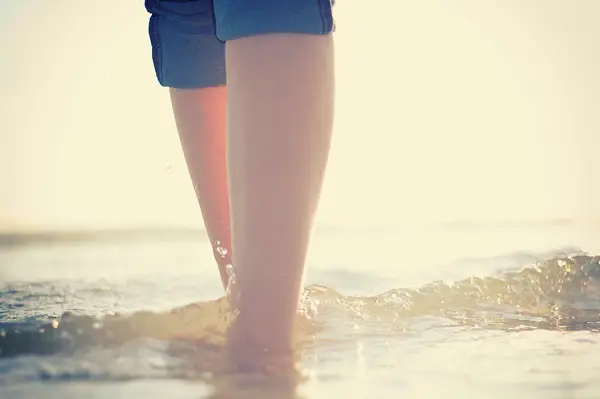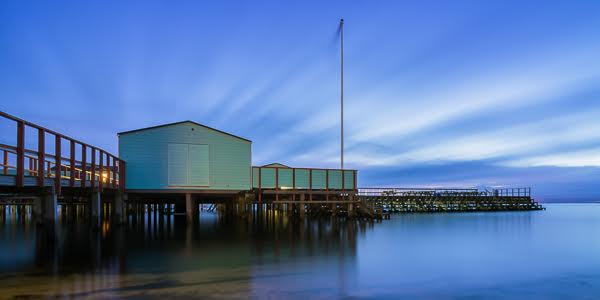According to NOAA, over 50% of the American population live within 50 miles of a coastline. Which means more than half of us are only a day-trip away from the beach. For photographers, this presents a ton of great photo ops.

Living half a mile from one of the top-rated beaches in the country myself, I’ve spent plenty of time attempting to capture the natural beauty I see. And what have I discovered? It ain’t easy!
A common complaint is that many beach shots look far too much alike. This is certainly something that can happen, but only if you haven’t tried looking at your surroundings in a different way. And of course, by observing a few simple bits of advice. Most of these can be applied to other types of photography as well, of course, but they seem to resonate even more true when applied to beach photography.
Stick to the Tried and True Golden Hours
If you’ve spent any amount of time in photography at all, you’ve heard the old adage about the golden hours. Shoot early, shoot late, avoid the midday. Of course these can be interpreted a little more loosely depending on the location and purpose, but shooting at the beach really does completely change for the better when the light is either just arriving or failing.

Morning shots will render dusky blues, while late evenings bring out the orange blaze of the sunset. The water magnifies these effects and will give your photos character.
Change your Perspective, Get Low
It personally took me a long time to try anything different when it came to perspective; I just couldn’t grasp shooting any other way than standing straight and shooting straight ahead from the center of my body. Nowadays, it’s a rare occasion that I shoot that way at all.

I’ve found that lowering your body (much easier to do than gaining height for perspective) completely changes your subject, even if your subject is no more than a horizon, or a sunset. Try taking a shot of the same scene, only squat down to the ground and shoot the same angle, as low as possible. Comparing the shots, you’ll see the difference immediately.
Avoid Perfect Symmetry
Another well-publicized tip that we hear often, definitely holds true when shooting a beach scene. The most uninteresting beach photo is the one we see the most often; a horizon of beach, ocean and sky, perfectly centered vertically in the middle of the shot.
Instead, try to give the most interesting portion of the scene the most real estate. If the ocean is flat and there is a cloudy or dramatic sky, shoot very little of the ocean and fill 3/4 of the scene with the sky. Likewise, a clear blue sky should be minimized if there are rough waves or other interesting subjects available in the foreground.
Do Something Different with Color
I’m a retro/vintage aficiando; not just with photography, but with everything. I tend to go for vintage looks in my post-processing. Yes, everyone is doing this now. My reasoning, however, has nothing to do with current trends. I don’t process my photos based on what I think other people want. Photography is art, and you should process it the way you envision it. I think the majority of photography looks more inviting with warm, soft, vintage coloring and tones. That’s just a personal preference.
While weathered styling looks good with beach scenes, don’t be afraid to try something different. Many ocean photos looks stunning in black and white (think contrast between dark water of rough seas and white tips of waves), and there is an entire spectrum of tone and exposure to play with. Try everything!
Get Away from the Beach
Seems a bit counterproductive, doesn’t it? Of course, I don’t mean leave the beach altogether..we’re talking about looking beyond the sandy stretch of land next to the ocean for inspiration. Move away to a remote section, check out the grassy areas behind the beach, anything to give yourself a better variety of subjects. You’d be surprised by the things you find; a pair of abandoned dress shoes (what happened the night before?), a row of small boats stowed away for the season, the sandy pathways leading to the shore. All of it makes for great content.

So the next time you’re on vacation to one of our beaches, or are lucky enough to live by the ocean like myself, take a moment to try something different, look for the unusual, and see if you can’t get the results you’ve been wanting with your beach photography.
Have a friend or fellow photographer that could benefit from these tips? Be sure to like and share this article on Facebook and Twitter, and let’s improve everyone’s photography! Don’t forget to share your beach photo experiences with us by leaving a comment below.
Need more ways to count your love for photography? Check out some of our other articles including 10 Up and Coming Young Photographers to Watch Out for in 2013, or 5 Awesome Ways to Grow as a Photographer.









Great Article, Tim. New knowledge for my photo taking!!
Tim- Great tips for shooting beach shots and any scene as well.
Thanks guys!
Good point, Patrick, these can definitely be applied to other scenes and formats as well !
Great Article, Thank you.